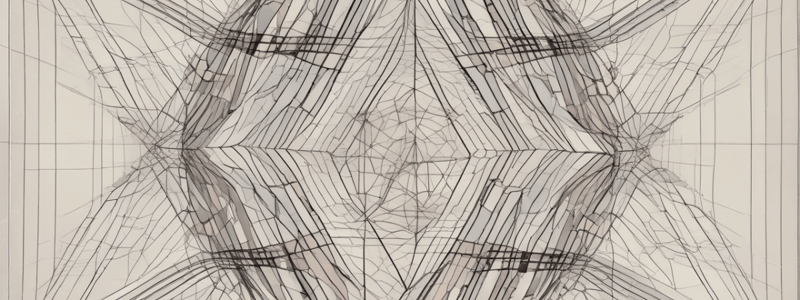Podcast
Questions and Answers
What is the purpose of the arrows at each end of a line segment?
What is the purpose of the arrows at each end of a line segment?
- To measure the length of the line
- To label the endpoints of the line
- To show the direction of the line
- To indicate that the line continues indefinitely (correct)
What is the term for the point where lines or line segments meet?
What is the term for the point where lines or line segments meet?
- Crossing point
- Intersection point
- Point of intersection (correct)
- Meeting point
Why can lines and line segments not intersect at more than one point?
Why can lines and line segments not intersect at more than one point?
- Because they are straight and linear (correct)
- Because they are one-dimensional
- Because they are always parallel
- Because they are infinite
What is an example of a curvilinear figure that intersects a line at two or more points?
What is an example of a curvilinear figure that intersects a line at two or more points?
What is the characteristic of two intersecting lines?
What is the characteristic of two intersecting lines?
What is the shape formed by two intersecting lines?
What is the shape formed by two intersecting lines?
What is true about systems of equations with more than two intersecting lines?
What is true about systems of equations with more than two intersecting lines?
What is a characteristic of intersecting lines?
What is a characteristic of intersecting lines?
What is the range of angles that can be formed by intersecting lines?
What is the range of angles that can be formed by intersecting lines?
What is an example of intersecting lines in everyday life?
What is an example of intersecting lines in everyday life?
What is the definition of perpendicular lines?
What is the definition of perpendicular lines?
What is a characteristic of parallel lines?
What is a characteristic of parallel lines?
What is a property of intersecting lines?
What is a property of intersecting lines?
What is an example of intersecting lines in art?
What is an example of intersecting lines in art?
What is the relationship between the slopes of perpendicular lines?
What is the relationship between the slopes of perpendicular lines?
Flashcards are hidden until you start studying
Study Notes
Definition of Lines and Line Segments
- A line is a straight one-dimensional figure that continues infinitely in opposite directions.
- Lines are infinite and cannot be measured, so they are often represented visually as a line segment with arrows at each end.
- A line segment is a part of a line with two endpoints instead of arrows.
- Line segments can be measured from one endpoint to the other.
Intersecting Lines
- Intersecting lines are lines or line segments that meet or cross each other at a single point, called the point of intersection.
- Lines and line segments are straight, linear figures, so they cannot intersect at more than one point.
- If two figures intersect at more than one point, at least one of them must be curvilinear, or curved.
Properties of Intersecting Lines
- Intersecting lines consist of two or more lines and/or line segments.
- They meet or cross another line at one and only one point, the point of intersection.
- They form any angle that measures between 0 and 180 degrees.
Examples of Intersecting Lines
- Intersecting lines can be found in everyday life, such as in writing, roads, art, construction, and tools.
- Examples of intersecting lines include the capital letters A, E, F, K, L, M, N, T, V, W, X, Y, and Z, as well as several lower-case letters.
Perpendicular Lines
- Perpendicular lines are lines that cross at a right angle (90 degrees).
- All perpendicular lines are intersecting lines, but not all intersecting lines are perpendicular.
- Perpendicular lines can form the shape of an "L" or a plus sign (+).
- When graphing perpendicular lines, the equations must have slopes that are negative reciprocals.
Parallel Lines
- Parallel lines are lines that will never cross because the distance between them remains constant.
- Mathematically, parallel lines have the same slope, so they are rising or falling at the same rate.
- Parallel lines never meet or cross.
Studying That Suits You
Use AI to generate personalized quizzes and flashcards to suit your learning preferences.




